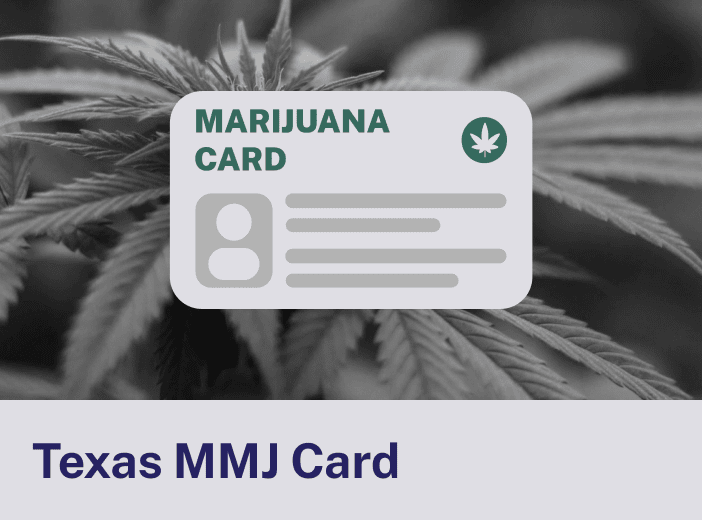How To Get a Medical Marijuana Card in Texas
- Texas Cannabis
- Texas Medical Marijuana
- Medical Marijuana Card
What is an MMJ Card in Texas?
A medical marijuana card (MMJ) is a state-issued card that identifies a qualified patient or a designated caregiver. The Texas Medical Marijuana Program, known as the Compassionate Use Program (CUP), does not issue medical marijuana identification cards to participating patients. Rather, patients registered in this program must meet their physicians to get low-THC cannabis prescriptions.
Who Can Get an MMJ Prescription in Texas?
The Department of Public Safety, the state agency running Texas’ CUP, does not have an age restriction for joining the state’s Compassionate Use Registry of Texas (CURT). However, minors must obtain the consent of their custodial parents or legal guardians before participating in Texas’ low-THC cannabis program.
Anyone diagnosed with one or more of the qualifying medical conditions recognised under the Texas’ CUP can access low-THC cannabis in the state. Texas also requires those applying to its CURT to be permanent residents of the state.
Can a Minor Obtain a Medical Marijuana Prescription in Texas?
Yes, a minor can legally access medical cannabis in the state if they join the CUP and are registered in the CURT. They would need the consent of their parents and the recommendations of their physicians to confirm their medical conditions are eligible for medical marijuana treatment.
What Conditions Qualify for Medical Marijuana Prescriptions in Texas in 2026?
As expressly listed under Texas Compassionate Act, House Bill 1535, you qualify for medical marijuana if you are diagnosed with one or more of the following debilitating or life-threatening medical conditions:
- Seizure disorder
- Amyotrophic Lateral Sclerosis (ALS)
- Incurable neurodegenerative disease
- Autism
- Epilepsy
- Multiple Sclerosis (MS)
- Spasticity
- Post-traumatic stress disorder (PTSD)
- Cancer
Medical conditions approved by the Texas Health and Human Services Commission for low-THC cannabis use in any research program are also eligible for medical cannabis interventions.
How Do I Get a Medical Marijuana Prescription in Texas in 2026?
Eligible patients and their legal guardians (for minors) do not register in the CURT themselves. Rather, when a physician deems a patient appropriate for medical cannabis use because of their condition, they will enter the patient’s details, as well as their cannabis prescription, in the CURT. The Registry retains the personal information of patients entered by physicians. They can then purchase marijuana from any dispensary in the state simply by visiting and providing valid IDs to verify their identities. Texas dispensing organizations can access the CURT to confirm the eligibility, identities, and prescriptions of Texans visiting them to buy marijuana.
How Does a Primary Caregiver Get a Texas MMIC?
Under the Texas Compassionate Care Act, there is no provision for primary caregivers. However, minors with qualifying medical conditions require the consent of their parents or legal guardians. For minors who are qualified patients in Texas, their legal guardians or parents would be able to buy cannabis on their behalf.
How Long Does it Take to Get a Texas Low-THC Prescription?
There is no waiting period for getting a medical marijuana prescription in Texas. Patients can get their low-THC cannabis prescriptions as soon as their physicians determine they are eligible for medical marijuana use and enter their recommendations in the CURT.
Getting a Texas Medical Marijuana Prescription Online
Patients eligible to access medical marijuana in Texas may be able to obtain prescriptions online if they consult with their physicians using telemedicine services.
How Much Does a Medical Marijuana Registration Cost in Texas?
Patients are automatically enrolled by their physicians following their consultations as long as the physicians recommend them for medical cannabis use. This enrollment is free. Patients may, however, pay for their physicians’ consultation fees.
How Do I Renew My Medical Marijuana Registration?
There is no need to renew a low-THC cannabis registration in the CURT.
What Documents Do I Need to Get a Low-THC Prescription in Texas?
The state also does not require documents to join its CURT. This is because physicians enroll eligible patients in the Texas’ medical cannabis registry.
Are My Details Kept Confidential When I Apply for a Medical Marijuana Registration in Texas?
Yes. The state keeps patients’ information contained in the CURT strictly confidential. Under the Compassionate Use Act, information relating to medical cannabis use should be kept and maintained by the Texas Department of Public Safety and these are not subject to public disclosure. In Section 487 of the Act, the Department is required to put in place procedures that would ensure the absolute privacy of qualified patients for medical use for cannabis within Texas
What Information Appears On a Texas Medical Marijuana Prescription?
Low-THC cannabis prescriptions are entered by physicians in the CURT. The information on each prescription includes the patient’s low-THC cannabis dose as well as their name.
Can Someone Track Me Down Through The Texas Low-THC Registry?
No, no one can track you down through the Texas Compassionate Use program. This is because the Department of Public Safety is required under the Compassionate Care program to keep confidential medical records for qualified medical marijuana patients. This means that information provided on the registry remains private.
Similarly, records containing personal information and patients’ diagnoses for medical marijuana submitted in the CURT, or provided at the point of sale at any of the three licensed dispensaries in the state, are confidential. There are certain state guidelines under the law that require dispensaries to keep a secure database for their patients. These guidelines recommend that dispensaries use basic data protection for customers' details, thereby ensuring the privacy of patient's records and information.
Apply For a Medical Cannabis Card
Book an Appointment
